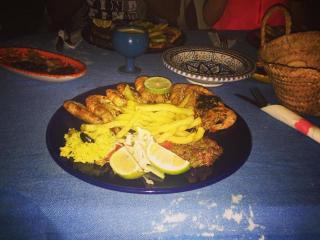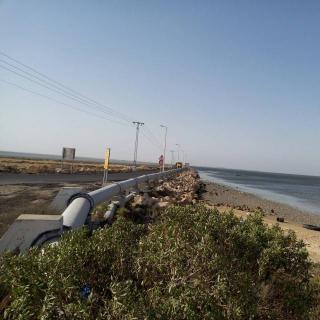Must-try Dishes
Brik - Fried Pastry (savory delight) - A crispy, thin dough filled with egg, tuna, or sometimes vegetables, deep-fried to golden perfection. Locals often enjoy it as a quick snack or at breakfast with mint tea while chatting with friends.
Mechouia - Grilled Vegetable Salad (smoky and refreshing) - Made with smoky grilled peppers, tomatoes, and onions, this zesty salad is often topped with preserved lemon and olives. It's a staple in local homes, typically served with grilled meats during lunch gatherings.
Couscous Djerbi - Local Couscous (hearty and fragrant) - This version features steamed couscous grains topped with tender lamb or chicken and a mix of vegetables simmered in aromatic spices. It's traditionally a Friday meal, bringing families together for a shared feast.
Poulpe Merguez - Spicy Sausage Dish (zesty and filling) - A dish combining spicy merguez sausages with tender octopus, simmered in a rich tomato sauce, creating a surprising yet delightful flavor pairing. Locals enjoy this dish during gatherings, especially in cooler months.
Kafteji - Vegetable Medley (colorful and comforting) - A flavorful mix of fried vegetables like peppers, potatoes, and eggplant tossed with a spicy tomato sauce, often garnished with an egg on top. You’ll spot Kafteji on breakfast menus, typically treated as a comfort food that’s great for sharing with family.
Chakchouka - Egg and Vegetable Stew (savory breakfast option) - A tomato-based dish enhanced with spices and poached eggs, often enjoyed with crusty bread. Best eaten in the morning, it’s a favorite hangover cure among locals, served fresh from the skillet.
Durum de Vache - Beef Wrap (hearty street food) - Grilled beef wrapped in flatbread, complete with pickled veggies and a spicy sauce, making for a filling meal on the go. You’ll find it in bustling market stalls, especially during the late afternoon when hunger peaks after a busy day.
Harissa - Spicy Pepper Paste (versatile condiment) - A fiery blend of chili peppers, garlic, and spices, used as a seasoning or dip for various dishes. It’s a common addition at family meals, but be cautious—a little goes a long way!
Desserts & Drinks
Mint Tea - شاي بالنعناع (refreshing herbal tea) - A sweet, fragrant green tea infused with fresh mint leaves and sugar, served hot in ornate glassware. Locals drink it throughout the day, often accompanied by dates, especially during leisurely afternoons or after meals.
Bouza - بوزة (almond ice cream) - A creamy, soft-textured ice cream made from almond milk and flavored with rose or orange blossom water, served chilled. It's a popular treat on hot summer days, often enjoyed in local cafés while catching up with friends.
Café Turka - قهوة تركية (strong coffee) - Finely ground coffee boiled with water and sugar, creating a thick, rich brew that’s poured into small cups. Often enjoyed in the morning or after lunch, it can be a social event where everyone takes their time savoring it, and it’s customary to linger and chat over this comforting drink.
Makroud - مقروض (date-filled pastry) - A crispy semolina pastry filled with sweet date paste and soaked in honey, often dusted with powdered sugar. Typically found in markets during special occasions like weddings or Ramadan, this treat is best enjoyed warm during festive gatherings.
Khobz Mella - خبز ملة (special occasion bread) - A sweet, fluffy bread flavored with orange blossom and topped with sesame seeds, usually baked for celebrations such as Eid. Locals love to share this aromatic delight with family, making it a heartwarming addition to festive meals.



